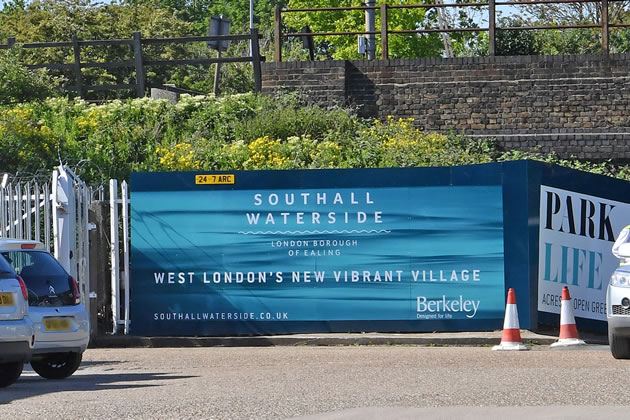Council continuing to rely on data supplied by developer

Concerns about the environment have been expressed since start of development
Southall residents have been waiting for nearly 10 months for independent monitoring to begin of the impact of air pollution from the former gasworks site on their health.
Residents and campaigners from Clean Air for Southall and Hayes (CASH) were told in July 2020 by council leader Julian Bell that an independent consultant would begin to monitor the site, being regenerated into thousands of homes called the Southall Green Quarter, from August 2020.
But in a letter from 22 April to CASH, Cllr Bell revealed the council only launched a tender for the work on 21 April, after lengthy talks with developer Berkeley Group over funding were concluded last month.
Cllr Bell said the delay was due to the coronavirus pandemic, while there were also difficulties in finding companies prepared to do the job in marketing tests. He added, “This is not a large sector and the process only identified one business who were willing to put forward a proposal.
“Despite this, given the level of expenditure required for an independent monitoring regime of the sort we both want to see, the council is legally required to undertake a full, open tendering process for the contract.
“I also want to provide assurance that, while Berkeley Group will be providing the funding for the monitoring, they will have no input over the selection of a contractor and they will have no ownership over the data produced.”
Until now monitoring of air quality data at the site has been done through a contractor commissioned by Berkeley Group, which sees the reports first before sending them to Ealing Council.
It’s hoped the move to monitoring through an Ealing Council contractor however will ease doubts in the community over transparency of the data.
In the details for the tender, Ealing Council is seeking a 24-month contract for an independent air quality monitoring programme to be carried out in addition to the existing data collection by Berkeley Group.
It is estimated following the tender, an independent air quality network will be installed in September 2021.
CASH chief Angela Fonso has said the group wants the independent monitoring to continue for the full length of the site remediation project, set to end in 2038.
Cllr Bell’s letter also invited discussions with CASH to discuss the plans and involve CASH so they can be assured a “fully independent and credible” monitoring regime is in place.
Tory opposition leader Greg Stafford pressed Cllr Bell on the delays in a letter on 9 April, asking for updates on the process and a commitment to further steps such as independent soil monitoring and a full health equality study to be undertaken.
He said, “The council has a social, moral and legal responsibility to ensure the health and safety of its residents and any delay in addressing the issues outlined above, will be seen as a gross dereliction of duty by your Labour administration.”
Previously work had been carried out to treat the soil at the development to make it safe, which ended in 2019, and Public Health England has produced a series of reports, the latest in 2020, finding it is “unlikely” there is a direct toxicological risk to the long-term health of the nearby population.
On committing to a health equality study, an Ealing Council spokesperson said a review was carried out last year which public data shows “no significant change” in asthma or cancer prevalence in patients registered with local GP practices.
They added, “However, it should be noted that there are substantial limitations to analysing health data. Even if there were statistically significant changes in these health indicators, it is virtually impossible to attribute causation without considering other factors that influence asthma and cancer incidence.
“These factors may include any demographic changes in the population (e.g. age and gender), changes in the behaviour of health professionals (e.g. increased recording of these conditions in the general practice registry) and changes in the vast range of risk factors for poor health (e.g. smoking, nutrition, alcohol, employment etc).
“The development of health conditions such as asthma and cancer is complex and involves multiple interacting factors over a long period of time, including genetics and multiple environmental risk factors.
“Therefore, any further analysis would not add to the reports already published.”
Anahita Hossein-Pour - Local Democracy Reporter
April 26, 2021